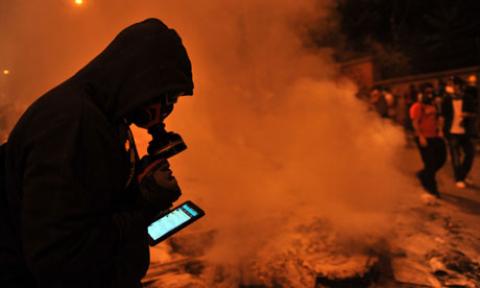- Turkish Protesters Using Encryption Software to Evade Censors - Charles Arthur (The Guardian)
- Jordan Blocks Local Access to News Sites - Rana F. Sweis and Jodi Rudoren (New York Times)
- UK Considers Stepping up Internet Blocking - Alison Langley (Columbia Journalism Review)
- U.S. Allows Export of Communication Devices, Software, and Services to Iran - John Ribeiro (IDG News Service)
- The Internet Revolution in Cuba - Roger Burbach (The Future of Twenty-First Century Socialism)
Turkish Protesters Using Encryption Software to Evade Censors
By Charles Arthur
June 4, 2013
The Guardian (UK)
Mobile internet users in Turkey are routing around suspected censorship by its government by downloading software that encrypts and hides their connections to the outside world, as the unrest in the country grows. People there are also downloading communications apps such as Twitter and Ustream, which can broadcast live video, and Zello, which works like a walkie-talkie, so they can record events and avoid surveillance, as protests and disorder entered their sixth day.
Over the weekend, more than 120,000 people inside Turkey have downloaded a free mobile app that provides a "virtual private network" (VPN) connection that cannot be tapped and can link to the outside world, avoiding censorship. The Turkish government has been repeatedly criticised by pressure groups inside the country who say it has been blocking or censoring Twitter and Facebook content for months leading up to the latest protests. Prime Minister Tayyip Erdogan recently called Twitter "a menace", adding " To me, social media is the worst menace to society."
Jordan Blocks Local Access to News Sites
By Rana F. Sweis and Jodi Rudoren
June 3, 2013
New York Times
The Jordanian government has blocked local access to about 300 news Web sites under a new law that the sites’ editors and international journalism experts have derided as dangerous censorship aimed at quelling criticism of King Abdullah II.
The law, enacted in September, requires news sites in the country to register with the government, pay $1,400 in licensing fees and hire unionized journalists as editors, steps that the site operators say they cannot afford. The law also makes editors legally responsible not only for the content of articles they publish, but also for comments posted by readers. Daoud Kuttab, who founded one of the first of the sites, AmmanNet, 13 years ago, said he was posting news on Facebook and on other Web sites his company owned that were not affected.
UK Considers Stepping up Internet Blocking
By Alison Langley
June 3, 2013
Columbia Journalism Review (CJR)
Should governments block websites that spread hardline ideology but don’t explicitly advocate violence—like the ones likely read by the Tsarnaev brothers, the alleged Boston Marathon bombers, or the two men being held for allegedly attacking a British soldier in Woolrich?
This is an idea that Theresa May, Britain’s home secretary, has floated in the wake of the fatal knife and machete attack earlier this month on an off-duty soldier, and it’s an idea under serious consideration by a task force headed by Prime Minister David Cameron.
“There is no doubt that people are able to watch things through the Internet which can lead to radicalization,” May told the BBC. Her suggested remedy is a three-pronged approach: ban more organizations and Muslim schools that the government believes are inciting hate; block extremist websites, and revive the Communications Data Bill, which would which would require Internet service providers and mobile companies to keep records of every user’s browsing activities, email correspondences, and texts for 12 months. Phone companies in the UK already are required to retain email and telephone contact data.
U.S. Allows Export of Communication Devices, Software, and Services to Iran
By John Ribeiro
May 31, 2013
IDG News Service
The U.S. government has lifted sanctions on the export of a variety of consumer communications devices, software, and services including mobile phones to Iran ahead of elections in that country.
The U.S. Department of the Treasury, in consultation with the U.S. Department of State, has issued a license authorizing the export to Iran of certain personal communications services, including anti-tracking software, anti-censorship tools and mobile phones. Exports of the devices to Iran had been blocked since the 1990s, but the U.S. government now says it aims to empower the Iranian people as their government intensifies its efforts to stifle access to information ahead of elections.
The export of the equipment to the Iranian government or to any individual or entity on a Specially Designated Nationals list continued to be prohibited.
The Internet Revolution in Cuba
By Roger Burbach
May 31, 2013
The Future of Twenty-First Century Socialism - Latin America's Turbulent Transitions
On Tuesday May 28 the Cuban government released a major policy statement on the expansion of the public’s use of the internet. During the first week in June, one-hundred-and-eighteen “navigation” centers will be opened up around the country. For the first time anyone can go to these centers and access the world wide web and send and receive email.
The opening of one-hundred-and-eighteen centers hardly constitutes “mass usage.” But it is the tip of the ice berg. The decree envisions the continual growth of internet facilities, the expanded use of fiber optic cables, and increased imports of telecommunications equipment. The Vice-Minister of Communications, Wilfredo Gonzalez, says Wifi and mobile connectivity as well as home access will eventually be made available, but given the actual infrastructure and financial limitations, the “emphasis is on reaching the largest number of people with the limited resources available.”


Spread the word